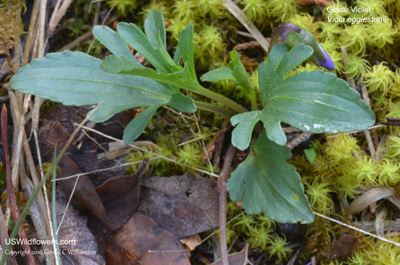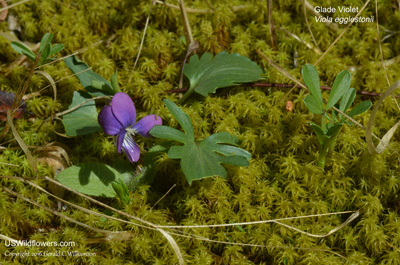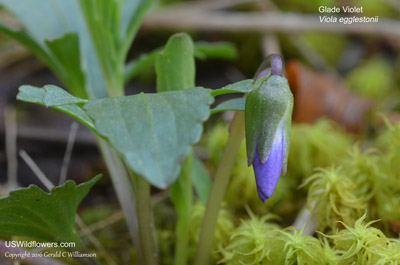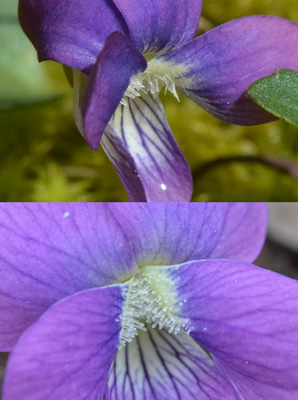Glade Violet, Eggleston's Violet - Viola egglestonii
|
Viola egglestonii - Glade Violet, Eggleston's Violet. While it is pretty easy to identify a violet as a violet, when I started identifying wildflowers I had no idea how difficult it can be, with some exceptions, to identify a violet to a species. Viola egglestonii is a violet which would be casually identified by me as a Wood Violet - Viola palmata - and indeed at one time it was classified as Viola palmata var. pedatifida. This is due to the lobed leaves and similar color these violets share - share with many violet species. In a glance the flower also looks similar to Viola sororia - Common Blue Violet - and Viola edulis - Salad Violet - and Viola cucullata - Bog Violet, as well as others, at least to those of us who lack expertise in the species. The differences in the various species mentioned comes to leaf shape (which can change with the age of the plant), leaf margins, hairiness of the stem and leaves, and density and shape of the hairs in the beard within the flower. You see my point about identification difficulties.
The environment in which a plant grows can be key to eliminating choices in identifying the species. Viola egglestonii is known as the Glade Violet because it is endemic to limestone glades and barrens primarily in central and eastern Tennessee, with its range extending to those habitats in northern Alabama and northwest Georgia on the southern end of the range, and into Kentucky and southern Indiana in its northern reaches. It is a protected species in Indiana and Kentucky.
Found in:
AL, GA, IN, KY, TN | 
Distribution of Viola egglestonii in the United States and Canada:

Blue=Native; Grey=Introduced
Map from USDA Plants Database:
USDA, NRCS. 2017. The PLANTS Database (http://plants.usda.gov, 25 Apr 2025). National Plant Data Team, Greensboro, NC 27401-4901 USA.
Search Our Database: Enter any portion of the Scientific, Common Name, or both.
Do a general Google search of the entire site:
#ad
 Follow USWildflowers on Twitter
#ad
| | Site: Chickamauga Battlefield Cedar Glade, Catoosa County, Ga Date: 2016-March-25 | Photographer: Gerald C. Williamson
Nikon D7000
Tamron SP 90MM f/2.8 AF Macro | | The flowers of Glade Violet are a blue-violet with a white center. The petals have dark veining. The lateral petals are bearded with hairs that are mostly uniform in diameter through their length. | | 
| | Site: Chickamauga Battlefield Cedar Glade, Catoosa County, Ga Date: 2016-March-25 | Photographer: Gerald C Williamson
Nikon D7000 | | The leaves of Glade Violet are usually 3 to 5 lobed, although some of those lobes may be cleft (leaf on the right), or there may even be up to 9 lobes (7 on the leaf on the lower left.) The leaves are mostly glabrous on both surfaces, and arise directly from the root. The central lobe is somewhat lanceolate shaped and much larger than the lateral lobes. | | Click on the photo for a larger image

| | Site: Chickamauga Battlefield Cedar Glade, Catoosa County, Ga Date: 2016-March-25 | Photographer: Gerald C Williamson
Nikon D7000 | | The flower stalk rises directly from the root, as do the leaves. The plant grows in an environment that is frequently saturated or flooded during the late winter and spring, and dry and desert-like in the summer and fall. | | Click on the photo for a larger image

| | Site: Chickamauga Battlefield Cedar Glade, Catoosa County, Ga Date: 2016-March-25 | Photographer: Gerald C Williamson
Nikon D7000 | | Viola egglestonii is mostly glabrous - leaves, petioles, peduncles, and sepals. Viola egglestonii will have cleistogamous flowers - self-pollinating flowers which do not open, but they are carried below ground until they are ripe. | | Click on the photo for a larger image

| | Site: Chickamauga Battlefield Cedar Glade, Catoosa County, Ga Date: 2016-March-25 | Photographer: Gerald C Williamson
Nikon D7000 | | This photo shows the hairs on the lateral petals of Viola egglestonii in their normal shape (top) compared to the clavate (club-shaped) hairs on a different specimen (bottom). While the shape of these hairs normally can be used to help determine the species, in this case it is possible that both of these photos are of Viola egglestonii. | | Click on the photo for a larger image

|
References used for identification and information:
|
|
| |
| #ad
|
|







